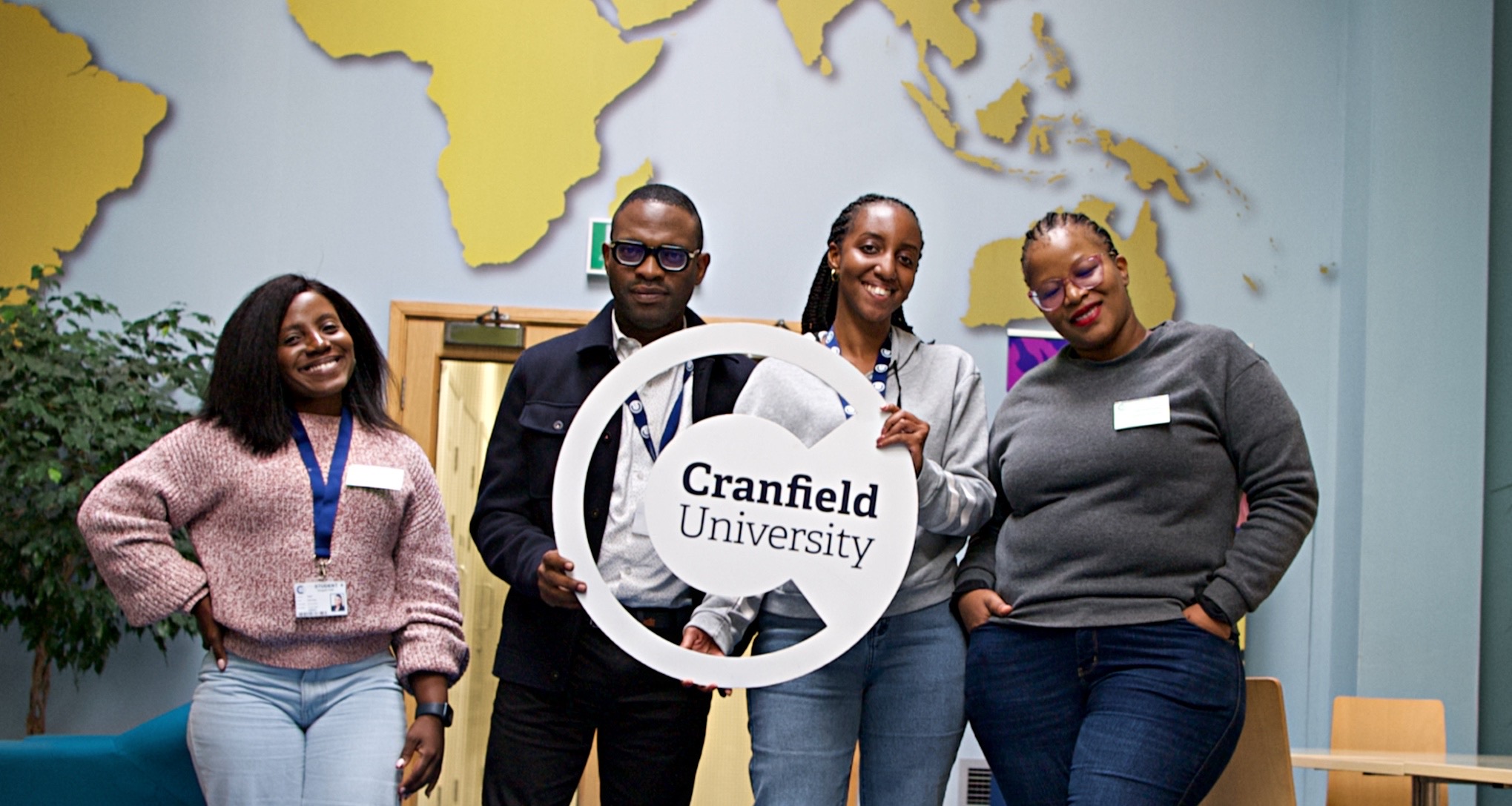How a Senior Leader Apprenticeship transformed my career
06/02/2023

In this Q&A, Alexis Drake shares her apprenticeship experience and explains why she chose to study the Senior Leader Apprenticeship+ Marketing and Leadership MSc at Cranfield School of Management.
Please tell me why you decided to study the Senior Leader Apprenticeship+ Marketing and Leadership MSc at Cranfield School of Management.
I decided to study the Marketing and Leadership MSc at Cranfield for three core reasons:
1. To consolidate the marketing experience that I gained over a lifetime
2. To learn strategic theories and concepts that backed up that knowledge.
3. And lastly, it was a really good way of spring boarding to a more senior career in marketing.
How important was it that the Marketing and Leadership MSc was developed in partnership with the CIM Academy?
It was important because CIM is a global, well-respected marketing organisation. This meant that the academics were underpinned by an industry-recognised qualification, which is a lot more practical for working people like me. The work-based project was fantastic for my employer because it meant they felt they got value from my studying as well.
How did the Apprenticeship Levy help you?
As a single parent, I could not self-fund a qualification like this. So, the apprenticeship levy funding was a great win from that perspective. It’s a gateway for working people to access higher education where they wouldn’t usually be able to do that, because you’re allowed to work at the same time. It also meant there was more support and input from my employer because it was so closely aligned with their objectives. So, it was a great opportunity and a great chance to do things in tandem with my employer.
What ‘skills for life’ can you contribute to your master’s-level apprenticeship?
Some of the ‘skills for life’ which I can contribute to my master’s-level apprenticeship were learned in the Organisational Behaviour course. This levelled up my emotional intelligence in a business context and really helped my communication skills in the workplace. I make a lot of data-led decisions now, so that’s revolutionised how I do marketing. I don’t rely on intuition alone like I used to previously. Lastly, portfolio building over the course of the two years was a useful exercise in tracking my development and progress. I could look back and see I’d experienced a lot of personal growth over that period.
What are the key benefits of studying for an apprenticeship?
Wow, there are so many benefits to studying for an apprenticeship. Firstly, you can work, study, earn, and apply the learning simultaneously. The minute you start the course, you’re applying it to your job. An unexpected benefit was that I got to meet peers in my industry; it’s easy to become myopic working in your own industry so it was a great chance for us to cross-pollinate ideas. You get put into learning teams and start to understand how people do marketing in different industries, which is great. I’ve definitely made friends for life on the course, which is wonderful at this point as being an adult, you don’t often get the chance to make new friends. It gave me more confidence in my abilities and also the credibility to say that I actually have this qualification.
Another benefit to the apprenticeship is that it’s portable. I was headhunted in the last three-quarters of the course, and I finished it off at Reed Talent Solutions. So, in terms of career acceleration, it’s been fantastic for me.
Do you have any tips for those considering studying for a master’s-level apprenticeship degree?
It is a demanding course, I can’t lie. There will be some lifestyle changes that you’ll have to adapt to. One of the things I’ve picked up in a previous qualification is this notion of having a jar that represents your life. In the jar you can fit ping pong balls, which are the most important things in your life like your family, your job, and the apprenticeship. They take up a lot of time, but you need to make space for them. Then you have the pebbles; these are other things like keeping fit, hobbies or seeing your friends. The pebbles take up less room but are still important to your quality of life. Then the sand in the jar is everything else that takes up your time, in an imperceptible way. The sand could be things like cleaning the house, watching the TV, scrolling through your Social Media feeds! It was all of this sand in the jar that I decided to remove. So, from a really practical perspective, I got a cleaner, I started ordering my groceries online and I didn’t watch too much TV over the two years. It’s about freeing yourself up and getting stuck in with the studying that’s important to your progression.
I would say for anyone who is on the fence, personal transformation starts immediately when you begin the program, literally from the very first lecture week. And I really felt that and I believe it’s totally worth it. I would say to people, if you are thinking about it, don’t delay and start the course!
Your tagline on your LinkedIn profile is ‘Better Never Stops’. Please tell me what this means to you.
It comes directly from my Managing Director, Lee Gudgeon, who adopted it from the All Blacks rugby team who also say Better Never Stops. It’s about learning from your mistakes, embracing innovation and striving for improvement. So, it linked really well to the team that I’ve joined here at Reed Talent Solutions, which is the continuous improvement team. I felt that there was a real synergy between that tagline and my job here.
Can you tell me about your current role as Talent Attraction Marketing Specialist at Reed Recruitment and how you are applying the knowledge from your Marketing and Leadership degree?
I’m the new Talent Attraction Marketing Specialist at Reed Talent Solutions, and that’s a brand-new role in this part of the business. I manage the candidate attraction strategies on behalf of our clients for their volume recruitment campaigns. I also do Consulting work through our sister company Consultancy+. My areas of specialism are Competitor Analysis, brand positioning and employer value propositions. In fact, I’ve used many of the models and theories learned on the course to turn into commercial products with a recruitment flavour, which is really exciting as it’s bringing the course back to life for me and providing ROI for my employer who invested in the last bit of my apprenticeship. I’m also involved in internal coaching, helping my colleagues be the best marketers that they can be. The role is very varied, and I’m delighted to be on board with them to push forward new strategies and services.
How are you applying the knowledge you learned in your Marketing and Leadership MSc?
I am applying the knowledge from my Marketing and Leadership MSc in so many ways, and some of them are completely unexpected. I’ve started to use a lot of leadership skills to communicate my vision for change. The Finance and Accounting module was very difficult but proved to be an unexpected benefit as it’s given’ me an understanding of pricing and costing, which is helping to position the new products I mentioned earlier. It’s also enabled me to have value-added conversations with the SLT and Finance teams, which I couldn’t have had in a legitimate or knowledgeable way before.
The work-based project also gave such a tangible result to my previous employer. I overhauled the website and was able to deliver and report on different metrics just three months after launch. I’m now advising on websites and microsites as part of my role here at Reed Talent Solutions and have been able to push forward strategies backed with consumer behaviour knowledge I learned on the programme.
Would you recommend the Senior Leader Apprenticeship+ Marketing and Leadership MSc?
This course will transform the way that you think. You’ll move from a place of intuition to making strategic data-led decisions. It’s also a springboard to a more senior career because the apprenticeship gives you space to reflect and improve your behaviours in the workplace. And lastly, it’s brilliant for networking with other marketers in your industry. You can share ideas and experiences, and gain ongoing support from your cohort, long after the course is finished.
Categories & Tags:
Leave a comment on this post:
You might also like…
Commonwealth Scholarships play a critical role in developing sustainability and leadership in Africa
Q&A with Evah Mosetlhane, Sustainability MSc, Commonwealth Distance Learning Scholar What inspired you to pursue the Sustainability MSc at Cranfield? I was inspired to pursue the Sustainability MSc at Cranfield because of the university’s ...
How do I reference a thesis… in the NLM style?
You may be including theses within your research. When you do so you need to treat them in the same way as content taken from any other source, by providing both a citation and a ...
Introducing… Bloomberg Trade Flows
Are you interested in world trade flows? Would it be useful to know which nations are your country's major trading partners? If so, the Bloomberg terminal has a rather nifty function where you can view ...
Cranfield alumni voyage to the International Space Station
Seeing our alumni reach the International Space Station (ISS) has a ripple effect that extends far beyond the space sector. For school students questioning whether science is “for them”, for undergraduates weighing their next ...
From classroom to cockpit: What’s next after Cranfield
The Air Transport Management MSc isn’t just about learning theory — it’s about preparing for a career in the aviation industry. Adit shares his dream job, insights from classmates, and advice for prospective students. ...
Setting up a shared group folder in a reference manager
Many of our students are now busy working on their group projects. One easy way to share references amongst a group is to set up group folders in a reference manager like Mendeley or Zotero. ...







